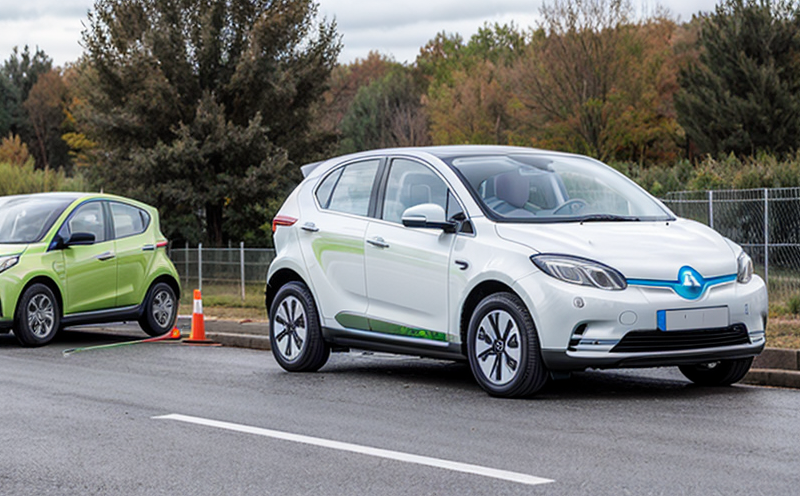IEC 62660-1 EV Lithium-Ion Cell Performance Testing
The IEC 62660-1 standard provides a comprehensive framework for testing the performance characteristics of lithium-ion cells used in electric vehicles (EVs). This standard is crucial for ensuring that the cells meet stringent safety, reliability, and performance criteria. The tests cover a wide range of parameters including capacity retention, cycle life, high-rate discharge capability, and temperature cycling endurance. These tests are essential to guarantee the long-term durability and efficiency of EV batteries.
Capacity retention measures how much charge remains in the cell after multiple cycles of charging and discharging. This metric is critical for assessing the longevity of a battery as it indicates its ability to retain its capacity over time, which directly impacts an EV's range. Cycle life testing simulates real-world usage conditions by subjecting the cell to repeated charge-discharge cycles until significant performance degradation occurs.
High-rate discharge capability is another crucial parameter that evaluates how well the battery can deliver power under high current demands. This is particularly important for electric vehicles where quick acceleration and rapid charging are expected. The standard also includes temperature cycling endurance tests, which simulate the thermal stresses a cell might experience in various environmental conditions. These tests help ensure that the cells perform consistently across different climates.
The IEC 62660-1 standard is not limited to just performance testing; it also covers safety aspects such as overcharge protection, short-circuit protection, and thermal runaway prevention. By adhering to these stringent standards, manufacturers can produce batteries that are safe, reliable, and efficient.
The testing process typically involves rigorous preparation of the lithium-ion cells. This includes conditioning the cells under specific conditions to ensure they are at a consistent state before testing begins. The test apparatus used is highly specialized and capable of accurately measuring various parameters with high precision. After each test, detailed reports are generated that include all measured data points along with interpretations and recommendations for improving performance.
The importance of IEC 62660-1 cannot be overstated in the context of e-mobility. As electric vehicles become more prevalent on our roads, there is an increasing demand for batteries that can withstand harsh operating conditions and provide consistent performance over extended periods. Compliance with this standard ensures that EVs meet industry standards and gain consumer trust.
The scope of IEC 62660-1 aligns closely with the broader goals of sustainability in transportation. By promoting the use of high-performing, reliable lithium-ion cells, the standard contributes to reducing reliance on fossil fuels and lowering CO2 emissions from transportation. This is part of a larger effort towards greener transport solutions.
Compliance with this standard also has significant implications for regulatory bodies and industry stakeholders. It ensures that products meet international standards, facilitating easier market access in countries that mandate adherence to these norms.
Eurolab Advantages
- Comprehensive Testing Capabilities: Eurolab offers a full suite of testing services tailored specifically for the battery industry. Our facility is equipped with state-of-the-art equipment capable of performing all necessary tests as per IEC 62660-1 standards.
- Expertise and Experience: With years of experience in this field, our team consists of highly skilled professionals who understand the nuances of battery testing. They stay updated with the latest developments in technology and best practices.
- Accurate Reporting: We provide detailed reports that are not only accurate but also easy to understand. These reports serve as valuable resources for decision-makers within organizations.
- Prompt Turnaround Times: Our efficient workflow ensures quick turnaround times without compromising on quality, allowing clients to receive timely results and make informed decisions promptly.
Eurolab's commitment to excellence in battery testing is reflected in our consistent delivery of high-quality services. We pride ourselves on providing reliable data that can be used confidently by all stakeholders involved in the development and manufacturing processes of lithium-ion cells for electric vehicles.
Competitive Advantage and Market Impact
- Innovation Leadership: By staying ahead of regulatory changes and industry trends, Eurolab maintains a competitive edge. Our clients benefit from early access to new testing methods and technologies that can give them an advantage in the market.
- Cost Efficiency: While maintaining high standards does not come cheaply, Eurolab ensures cost efficiency through optimized processes and economies of scale achieved by handling large volumes of tests annually. This allows us to offer competitive pricing without sacrificing quality.
- Broad Customer Base: Our reputation for delivering accurate, reliable results has attracted a diverse clientele ranging from small startups to global giants in the automotive sector. This broad base helps us stay informed about various market needs and trends.
The impact of adhering to IEC 62660-1 extends beyond individual companies; it contributes positively to the entire industry by setting benchmarks for performance and safety. Compliance with this standard enhances public perception towards electric vehicles, promoting greater acceptance and adoption rates worldwide.
Use Cases and Application Examples
- New Product Development: Manufacturers can use IEC 62660-1 tests early in the design phase to identify potential issues and optimize their product designs for better performance and reliability.
- Quality Control: Regular testing throughout the manufacturing process ensures that only high-quality cells make it into final products, enhancing overall product quality.
- R&D Projects: Researchers can leverage these tests to explore new materials and configurations aimed at improving battery performance further.
- Supplier Evaluation: Companies often use third-party labs like Eurolab for independent assessments of their suppliers' cells ensuring consistent quality across supply chains.
These applications underscore the importance of rigorous testing in maintaining high standards within the EV industry. Proper implementation of IEC 62660-1 contributes significantly to advancing technology and fostering innovation.





